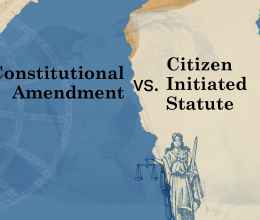Honorable Gene Zmuda
Chair, Sentencing Data Platform Governing Board
Sent via email to: [email protected]
Sara Andrews
Executive Director, Ohio Criminal Sentencing Commission
Sent via email to: [email protected]
Dear Judge Zmuda & Director Andrews:
The ACLU of Ohio remains deeply appreciative for your ongoing and important efforts to make us and others aware of the process to create a felony sentencing database in Ohio and the opportunities for all following and interested in this development to share their thoughts and opinions.
The ACLU of Ohio has long advocated for data collection that will better inform and guide Ohio's decision-makers and numerous stakeholders as we all navigate a very complex, multi-pronged criminal legal system with impacts that reach throughout the state in countless ways.
As always, we endeavor to make sure all such positive attempts result in the best final product possible. These opportunities do not often present themselves so we recognize the need to get as much of this right when these opportunities arise.
In this spirit, the ACLU of Ohio has two major concerns with how plans for the sentencing database are proceeding. We know these concerns from us are not new to you, but we submit our formal written comments to ensure the Sentencing Data Platform Governing Board and others are fully aware of both our concerns and our desire to be as helpful as possible.
Level of Publicly Available Detail
Our first major concern with the current sentencing database plans regards the amount of information that will be available to the public. Or, rather, the amount of information that will be unavailable to them. Our understanding is the public will have no access, via the database, to information about individual counties, individual courts, or individual judges.
Instead, our understanding is the information will be presented or available in a way that, at its most detailed, will only reveal how "counties of a similar size" operate. This presents significant transparency problems.
To further illustrate these concerns, consider the offense of Drug Possession as an example. According to data from the Department of Rehabilitation and Correction, for the past seven years, the number one reason someone is sent to an Ohio prison is for a drug possession conviction. So, this is a particularly relevant offense to examine.
In late 2011, House Bill 86 was enacted. Among other provisions in that bill, now law, are alternatives to sending some people to prison for some lower-level drug possession convictions. While HB 86 established a presumption against prison time in a variety of situations involving drug possession, judges still retained some discretion with regard to sentencing. However, HB 86 did not work as intended as the number of people convicted for drug possession and sent to prison continued and still continues at similar (and sometimes increased) rates than before HB 86.
In 2018, Issue One was on the Ohio ballot as a proposed state constitutional amendment. Passage of Issue One would have reduced penalties for some drug-related offenses, with the same basic goal as HB 86 to reduce incarceration for people with drug problems. Throughout the debate over Issue One, various judges and prosecutors across Ohio claimed Issue One was unnecessary, in part, because people were by and large not being sent to prison for such convictions. This is not what statewide trend data shows.
A comprehensive felony sentencing database would and should show exactly how individual judges, in individual courts, in individual counties, treat drug possession offenses and convictions in their respective courtrooms. To illustrate the type of information the ACLU of Ohio believes must be included via the proposed felony sentencing database, I have provided a one-page document further detailing the amount of and types of information that can and should be available to Ohioans. This is surely not an exhaustive list, but it illustrates our point.
Indeed, drilling down only to a level of information and data that ends with "counties of similar size" will be of little use to stakeholders, advocates, legislators, researchers, news media, and others.
Put another way, when some legislative proposals are discussed or bills are introduced regarding mass incarceration and/or the criminal legal system, it is often wondered whether the problems the legislation addresses and seek to improve are statewide problems. Or, do problems result from just some courts or judges in Ohio? Is a bill with statewide application and all the massive effort needed to pass that bill necessary? Or could much of the problem be solved with targeted education, advocacy and engagement at local levels? Again, a comprehensive, effective database will highlight how widespread certain problems are, or are not, across Ohio and, when they exist, where. Current database plans will not shed light on this level of information.
Public Records
Our second major concern is closely related to the first. Under current plans, it is our understanding the records and data received by the Ohio Criminal Sentencing Commission for the purposes of inclusion in the database will not be available to the public via a records request. Instead, according to the most recent language we have seen proposed, it would be the sole discretion of the Sentencing Commission what, if any, data would be released to the public via the planned public portal.
Even with a sentencing commission absolutely devoted to preparing and disclosing as much data as possible via the public portal, we cannot imagine all the data the public would find helpful will be made available. After all, different people and stakeholders will seek different information for different reasons. While our earlier observations were centered around drug possession, others will want similar data regarding such issues as gun violence, sex assaults, recidivism, demographic differences between defendants, and much more. How much capacity will the Sentencing Commission have to make as much information available as soon as possible, on an ongoing basis, if that is their intention?
Of course, capacity concerns could also affect how timely the Sentencing Commission would be in responding to records requests. Certainly, the ACLU of Ohio would support, encourage, and advocate for increased funding for the Sentencing Commission to fulfill records requests, should increased capacity be necessary.
In addition, the proposed language we are aware of that explains this data would still be available via its originating source, i.e. the individual courts, is not adequate to satisfy our concerns. As expressed in our first concern, those seeking information from individual courts will be hampered by their inability, under current plans, to understand if they must, by necessity, be contacting all courts, many courts, or just some courts because they will only be presented with data that compares, at best, counties of a similar size with no further detail or specificity.
Of course, that data is all currently available via its originating source. The problem for people interested in this data has always been an issue of capacity as few, if any, are equipped to contact up to 88 different common pleas courts and navigate the cumbersome process of getting their records requests adequately fulfilled in a timely manner from multiple sources. These concerns are further compounded by courts that refuse to comply with records requests. The unfortunate reality is every time the ACLU of Ohio attempts to gather data for research purposes by contacting large numbers of courts, some never respond with records, or acknowledge our requests at au, despite our numerous attempts.
For these reasons, we do not believe the Sentencing Commission should be the sole arbiters of what database information is released and via what methods. A commission that is intent on releasing as much data as possible can someday also be a commission that releases none, as permitted by the current proposal.
The creation of a felony sentencing database will be one of the most impactful developments in decades in Ohio's criminal legal and mass incarceration systems but only if the data provides Ohioans and stakeholders with complete and thorough information. Ohioans deserve access to much more than broad brushstrokes. Accordingly, the ACLU of Ohio will continue to advocate for these changes and encourage others to do the same.
Again, the ACLU of Ohio understand the monumental task and rare opportunity at hand. We greatly appreciate your ongoing efforts to explain and answer questions regarding the felony sentencing database. We look forward to continued discussion and stand ready to assist however we can.
Sincerely,
Gary Daniels
Chief Lobbyist
ACLU of Ohio
Jocelyn Rosnick
Policy Director
ACLU of Ohio








